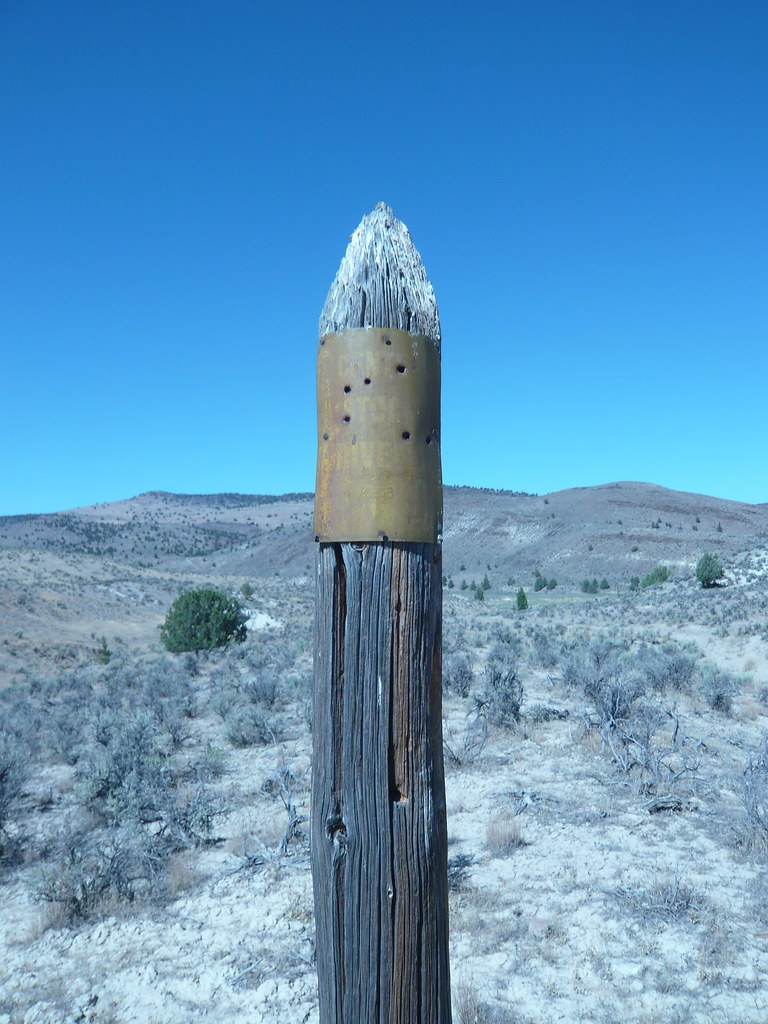 People often refer to most of the American West as 'desert,' but strictly speaking much of it is not true desert, but scrubland. It's a minor difference both ecologically and semantically, but much of Oregon falls into the latter category. However, the southeast corner of the state is true desert by anyone's standards (it's the northern reaches of the Great Basin Desert, for those of you who are sticklers for this sort of thing), and that's where I spent the last week. I was there with the rest of the U of O vertebrate paleontology program (all 5 of us); our main goal was to re-locate several sites collected in the 1950s and '60s that have since fallen into neglect. I'll confess that at first I was not too thrilled with the idea, partly because I'm never too happy about leaving my cat behind, partly because I much prefer lab work to field work (the lab is where real science is done, after all), but also because I find deserts oddly unsettling. This is probably because the desert is so radically different then the wet, temperate climates in which I've spent most of my life. To give just one example, rain west of the Cascades is at worst an annoyance, at best something to be welcomed because it keeps everything so green. Head east of the Cascades, though, and rain can kill you if it comes down hard enough to trigger flash floods (to say nothing of the lightning that often accompanies it).
People often refer to most of the American West as 'desert,' but strictly speaking much of it is not true desert, but scrubland. It's a minor difference both ecologically and semantically, but much of Oregon falls into the latter category. However, the southeast corner of the state is true desert by anyone's standards (it's the northern reaches of the Great Basin Desert, for those of you who are sticklers for this sort of thing), and that's where I spent the last week. I was there with the rest of the U of O vertebrate paleontology program (all 5 of us); our main goal was to re-locate several sites collected in the 1950s and '60s that have since fallen into neglect. I'll confess that at first I was not too thrilled with the idea, partly because I'm never too happy about leaving my cat behind, partly because I much prefer lab work to field work (the lab is where real science is done, after all), but also because I find deserts oddly unsettling. This is probably because the desert is so radically different then the wet, temperate climates in which I've spent most of my life. To give just one example, rain west of the Cascades is at worst an annoyance, at best something to be welcomed because it keeps everything so green. Head east of the Cascades, though, and rain can kill you if it comes down hard enough to trigger flash floods (to say nothing of the lightning that often accompanies it).There are plenty of other differences as well, of course, and it is by that same token that deserts also hold a strange fascination for me (the list of things that simultaneously creep me out and appeal to me is a long one). As a kid, my favorite nature programs were those set in Arizona or the Sahara, largely because the wildlife was so radically different than anything we saw in western Washington. The animals (and to a lesser extent the plants) of the North American desert are still the main attraction for me; there's something to be said for living in a state in which you can drive only a couple of hundred miles and find yourself in a completely different ecosystem filled with exotic organisms. I especially like the bestiary of biting, stinging, and prickly animals (though I also realize that these are the main complaint about the desert for most people). It's always a bit of a thrill to come across a rattlesnake, scorpion, or black widow (none of which are a particularly great threat to a healthy adult, especially if viewed from a prudent distance; the only desert animals I would just as soon avoid completely are the giant Pepsis wasps which lay their eggs in living tarantulas and can inflict the second most painful injury - and most painful sting - of any insect).
I'm happy to say, that on balance, this trip fell more towards the interesting rather than the nerve-wracking end of the spectrum. The weather was perfect (though there was one afternoon of looming rain clouds that had me a bit nervous), the wildlife was present but unthreatening (with the exception of the clouds of mosquitoes that descended upon us nightly; that's what we got for camping in the wettest spot in the area, I guess), and the paleontology was, on the whole, successful. While our main goal was to locate old sites and get a sense of the regional geology, we also spent a fair amount of time prospecting for fossils. We came back with a respectable haul of camels, horses, mastodonts, and lots of catfish; one of our crew even found a dog jaw that I'll be able to use in my dissertation research. In the end, then, it was well worth it, but it may be some time before I'm ever truly comfortable in the desert.
No comments:
Post a Comment